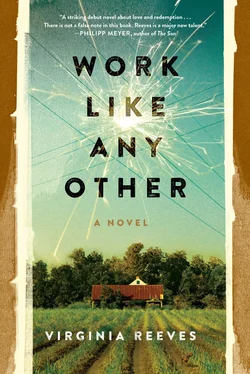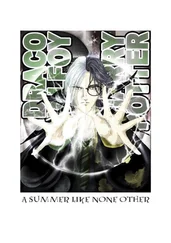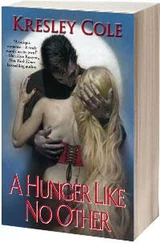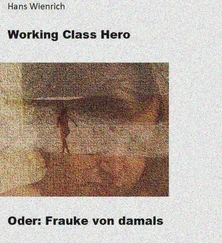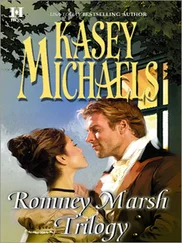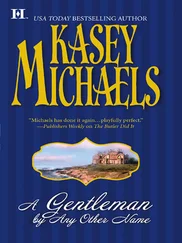The embrace ended before I’d had time to process my response to it. We were nearer than we’d been since the day Sheriff Eddings had come for me. We’d joked over dinner about the knock at the door — a pirate come to steal our treasure. We were planning a sword fight. I’d tousled his hair on my way out, promising to be back before bedtime.
“I got news of your release. Moa told me you were here.”
“Oh?”
He looked toward the trees. “I wanted to visit you while you were away,” he said eventually.
“Why didn’t you?”
This was my question — the only one I cared about — and the conversation was his to make or abandon. I watched his teeth bite at the inside of his cheek, a habit I’d seen in him as a child—gnawing away at himself when he was thinking, eating himself into an idea. He’d bitten his nails then, too, and I saw that his nails were still rough, the skin around them torn and red.
“Mother convinced me you were to blame. For everything — Wilson and our back payments and the years we struggled after what happened. The death of that man.” Gerald raised his hulking shoulders up to his ears. “I guess I just got tired of fighting her. But then I got that call from Moa, telling me that you were here, and I–I had to come.” He brought a thumb to his mouth, but there was nothing to chew or clip.
I couldn’t tell whether it was a good thing to see him, or whether it was awful. He had been my boy for those good years, and I had known what fatherhood could be, but then he’d disappeared. I had disappeared. I didn’t know I would stop being his father that day Sheriff Eddings came. Gerald didn’t either. And now he was telling me he might have been my son these nine long years, had his mother let him.
I tried to figure out how to start that process — parenting. I could invite him inside, offer him a glass of water to stave off the heat, maybe a jar of peaches to quench his chewing and distract his hands. The words were ready in my mouth, clear in my mind. Come in, I would say. Come inside out of the heat. Let’s sit down and talk awhile. We have a lot to catch up on . I would put my arm around his shoulder, though he’d grown taller than me, making the gesture awkward, but no less heartening. Come inside, Son. I’ve missed you .
And I had. I did. I do still. I miss the nine-year-old version, the ten-year-old, and the eleven-year-old, too, and I wanted that child to translate into the stranger in front of me, with his meaty face and messy hands. I wanted to know how to be his father.
“I’m sorry. I’m so sorry, Pa.”
For a moment I could see us together — on a walk out to the lines, in the shop watching the thresher, pushing out to the south woods in the fall, rifles on our shoulders, venison steaks on our minds. I had taught him to shoot.
“I should’ve gone against her earlier.”
I let the rake fall to the ground and reached for him with my good arm. He was so tall and so thick. He hadn’t even begun the route to manhood when I left, hadn’t grown any hairs or inches, and I found myself imagining every one of those moments I’d missed — the first beard and mustache, the first shave, the drop in voice, the thickening of the legs, the hair growing in dark and thatched, covering his body. He would always be a man, now, and I had missed him become one.
I did ask him inside, but he declined quickly. “I can’t stay. I didn’t even know I was coming today — I just got in the car. I have to be back for a shift in the library.”
“I worked in the library at Kilby.”
“Mom told me. She never showed me your letters, but she gave me updates sometimes.”
“So she read them.”
For a moment again neither of us spoke.
“Could I come again? Maybe this Saturday?”
“Yes. Please.”
We shook hands — right hands, and he looked at the reduced height of my arm. “Is that from the fight you had with another inmate? I remember getting word about that.”
Wilson had told me the same.
“It’s a different injury. Later, from a guard, not an inmate, but it’s fine.” I held on to his hand. “Did your mother visit me when I was injured that first time? Did she come to the hospital?”
Gerald looked caught, a trapped thing. “We’ll talk about it next time I see you, all right?”
So Marie had come. Those flimsy visions in the hospital had been grounded in at least some truth. She’d said something, and we’d been together long enough for her to put something in my hand before Nurse Hannah chased her away. Crows in flight, pecking and shouting.
“Next time.”
“Good-bye, Pa.”
He walked toward the trail, the back of him holding up greater than the front. His hair needed a trim, and there were sweat rings under his arms, but I could appreciate his stride — quick and long. Still, I admit to wanting his appearance to be like so many of my other imaginings, a shaky reality, untenable and flawed. I was afraid after Gerald left the clearing. My rake was at my feet. Maggie lay in the shade of the cottage. A bird let go a song, steep-noted, unique. I should have known what it was. I could name all the plants around me, the trees and shrubs, flowers and grasses. I could raise poles and wire an abandoned cottage. I could strip a roof and stand in the midst of years of rot, willing it dry enough to burn. But I didn’t know if I could be a father to a son.
GERALDdidn’t come that Saturday, but Jenny did, an envelope in her hands. I was outside the cottage, and she walked toward me slowly.
“What’s that?”
“It’s come. Word from Kilby.”
The look of my name on the paper scooped some great dormant need out of my stomach. I’d waited for my name in that location for nine years, Kilby Prison in the upper left, with its address there on Wetumpka — Montgomery Highway. I didn’t recognize the writing, a blocky print, a bit too big for the space. Someone had written my name on that envelope and put it in the mail, and a man had delivered it to the big house, where Marie had received the letters I sent. Her handwriting was much lovelier than the writing I held, but she didn’t once turn that writing into words and send those words to me. Few things go freely through the walls of Kilby, but letters are one of them. Just one letter, Marie. One envelope with my name in your hand. Roscoe T Martin. Only four weeks had passed before Kilby answered mine.
“I don’t know that I can open this.” My fingers had already left brown smudges on the paper that I would have liked to wipe away. It was too perfect a thing, that envelope.
“You best,” Jenny said. The mulch was thick at her feet, and her hands worked at the fabric of her skirt, wringing it to wrinkles just as she had when she’d first asked me to help with Charles.
The flap gave way easy enough along the glue, the paper inside thin and folded into thirds.
“What does it say?”
The message was short, the writing even bigger and sloppier. “Nothing.”
“Nothing?”
And so I read the unfamiliar writing aloud: “ ‘Martin. You no beter an to ast me the foks past threw here. Hows that dog?’ ” After the question mark, the writing changed to form one new word: Taylor . It was practiced, that word, the only one he really needed. The rest of the letter must have been turned from Taylor’s speech into words on a page by one of his new trustees. This one didn’t look to be taking out books from the library or ordering up articles on whelping.
The letter was short, but I could hear Taylor’s voice in it. Those few words were communication from him to me. I’d written a letter to Taylor, and he’d written one back. He even asked a question.
Читать дальше
